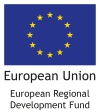In English
The second Central Baltic programme project to finish was EDU-SME's. In this interview, the project manager Eija Källström, talks about her first impresssion after the project ended. Based on her experience, also shares some insights on project implementation.
First impression after the project ended. How does it feel?
It feels good: cross-border cooperation allowed us to make our plans come through and to experience how ideas can turn into a project. It’s also great that even though the project ended, our cross-border cooperation will continue. The network lives on and we will have the privilege to disseminate our results to other people and also to further develop our concept.
What was the project about?
It was about opening doors to teachers, to businesses and to other educational institutions in the Central Baltic region. Together we developed new learning materials and identified international market opportunities for Small and Medium Enterprises (SMEs).
How we did it? We got teachers from different institutions and different countries in the region to work together to create new learning materials to be integrated in the curricula of the institutions we were collaborating with. And we involved companies as well in the process. This was especially exciting for teachers interested in cross-border cooperation. The project gave them an opportunity to exchange knowledge. Everything we achieved was because of team work and networking.
What was your recipe for effective internal communication?
It was not more difficult than I expected. Of course it took a lot of planning especially because our project lifecycle was quite short, but I think that what helped the most was the fact that we knew each other before and that we carefully planned the project together since the very beginning.
Did you find it difficult to work with partners from different countries?
It was sometimes a challenge. Private companies operate with different goals and at a faster pace in comparison to the public sector. And the fact that we were all located in different countries complicated the matter further, but we succeeded in our endeavor and learned a lot in the process.
Has this project managed to reach your target group?
Yes, definitely. We have also produced the outputs we foresaw and a long list of deliverables.
Do you have an interesting project related story to tell??
Many stories. Students, for example, felt they did something that mattered. They feel proud in being able to support SMEs internationalisation. And if I think about SME’s it comes to mind the seminar/webinar we held in Riga. Some people attended physically, others virtually. It was an interesting experience; we realised how easy it can be to reach a large group of companies in the region. And last but not least teachers, felt the joy of creating learning materials with their peers.
Here is a little challenge; could you tell us about the story of the project in six words?
One could be: “The project ends but cooperation continues”. It means that we did not create networks only for the sake of the project, rather to create a framework for ongoing cross-border cooperation in our field. Another could be: “creating curricula together over national borders.
Do you think that this project has contributed in changing someone’s life?
The project was quite short. We would need a follow up in order to answer this question. But what I can say is that the project provided companies with knowledge about the markets they planned to enter and it made it easier for them to decide if they should do it or not. In addition, the educational institutions involved, got new learning materials.
Any plans for the future?
We are planning to build on the networks we have created and to expand especially in the Nordic and Baltic countries.



